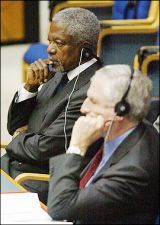Security Council hopes South deal will help resolve Sudan’s Darfur crisis
UNITED NATIONS, Jan 5, 2005 (UN News Centre) — Welcoming the initialling of the final two protocols of a comprehensive peace deal to end the 21-year civil war in southern Sudan, the Security Council today voiced hope that the agreement will play a role in resolving the separate conflict engulfing the country’s Darfur region in the west.

|
|
UN Secretary general Kofi Annan and US Representative at the UN John Danforth during the special session of the Security Council on Sudan held in Nairobi last November 2004 (AP). |
In a press statement read out today by Argentina’s Ambassador César Mayoral, Council President for January, the 15 members said they hoped the agreement “would have a positive impact on the situation in Darfur,” where tens of thousands of people have been killed and more than 1.85 million others live as refugees or internally displaced persons (IDPs).
The statement said the Council also looked forward to Sunday’s formal signing of the peace deal initialled last Friday in Naivasha, Kenya, which brings to an end the conflict in southern Sudan between Government forces and members of the rebel Sudan People’s Liberation Movement/Army (SPLM/A). Jan Pronk, the Secretary-General’s Special Representative to the country, will attend the signing ceremony.
Meanwhile, in North Darfur state, UN humanitarian officials are being dispatched to the area around Tina to determine whether the conditions there are safe and appropriate for large numbers of refugees to return.
The assessment mission has been arranged after refugees began returning to the district following the striking of an agreement between the Sudanese Government and the rebel National Movement for Reform and Development (NMRD), one of several rebel groups fighting with Khartoum.
In another part of North Darfur, a delegation of staff from UN humanitarian agencies and non-governmental organizations (NGOs) visited two IDP camps earlier this week to gauge whether relief work can resume there after previously being suspended for security reasons.
More than 30,000 IDPs living in the camps at Tawila and Dali were given food, the UN Office for the Coordination of Humanitarian Affairs (OCHA) reported, while many IDPs told the delegation of their concerns about the recent doubling of some commodity prices and the lack of drugs and other health services to combat diseases such as malaria.
